The Biggest Mistake You Can Make With an Autistic Person Is to Assume We Know What We Did Wrong
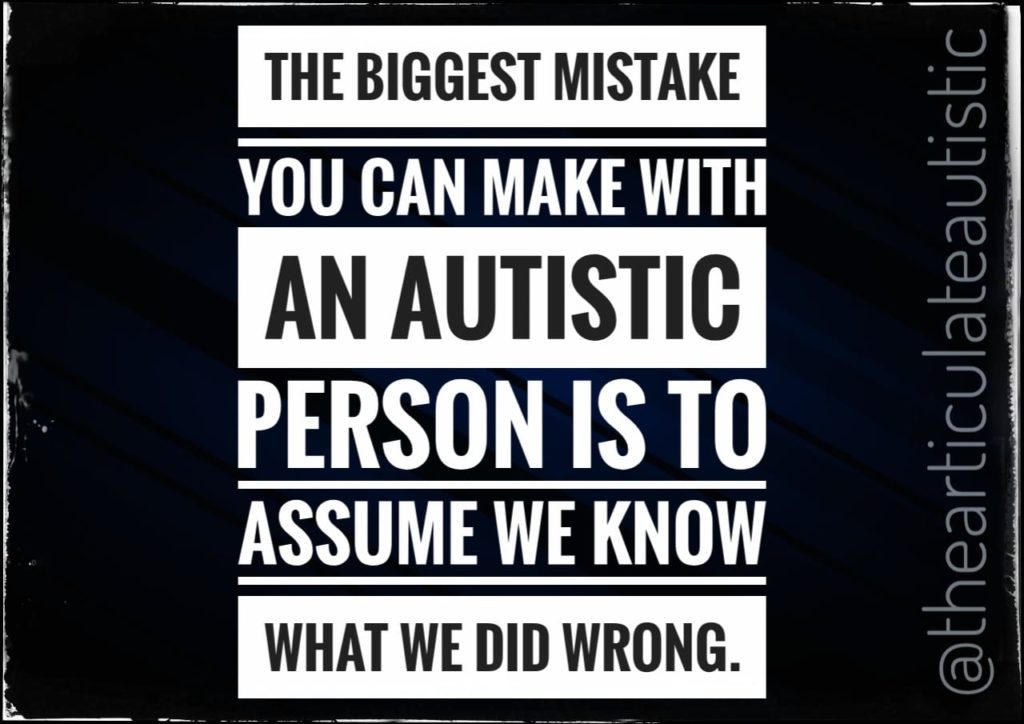
The blog post I wrote about how to tell an autistic person we’ve upset you and be understood resonated with so many, I wanted to do a follow-up.
One of the biggest mistakes you can make with an autistic person is to assume they know what they did to offend you and respond accordingly.
I believe this is one of the PRIMARY CAUSES of PTSD in autistic people.
In our eyes, when we’re spending time with you, we’re just doing our best to relate, fit in, and be accepted. We aren’t even imagining ways to hurt or offend you!
(That isn’t to say autistic people are angels, and we never do anything offensive on purpose, but that’s not the point of this particular post.)
So, if you feel offended by something your autistic loved one says or does, and you respond the way you would to a person who knows full-well that what they’ve said or done has upset you, you will scare the living crap out of them!
This Is What It’s Like From Our Perspective
Imagine you and a friend are relaxing with a nice cup of tea, having a pleasant conversation, when you decide to bring up a benign topic like the weather.
All of a sudden, they give you a dirty look, scream at you, throw the cup against the wall, and storm out of your house.
How would you feel?
Lost? Confused? Hurt? Angry? Terrified? All of the above?
That is EXACTLY what it feels like when a neurotypical (non-autistic) person responds to what they perceive to be a purposefully insulting comment full-throttle.
It is DEVASTATING. And, at this point, whether we are being screamed at or spoken to, it will not matter. At that point, we’ve already shut down to protect ourselves. It’s an automatic mechanism that can’t be stopped.
Also, if you try to ask us why we said or did the thing later, chances are, we won’t even recall what was said or done because we’ve blocked it out because sudden and loud reactions cause shutdowns and meltdowns.
(Article continues below.)
The best way to improve communication with your autistic loved one is to understand how your autistic loved one’s mind works! Intentions, motivations, and personal expressions (facial expressions or lack thereof, body language, etc.), are often quite different in autistic people than they are in neurotypical people.
Experience a better understanding of your autistic loved one by reading books about life from an autistic perspective as well as stories that feature autistic characters. You’ll have so many “Ah ha!” moments and start seeing your autistic loved one in a different light (and you’ll have a better understanding of their behaviors, which you may have been misinterpreting up until now).
Books I recommend for a better understanding of your autistic loved one:
The Formula for Successfully Communicating Your Hurt Feelings to Your Autistic Loved One
So, I’ll give you the formula I gave in the last post for communicating to an autistic person what they’ve done or said that seems offensive to you without traumatizing us and frustrating yourself.
Because, 9 times out of 10, we have absolutely no idea what we’ve said or done to upset you.
Here it is:
1) Take a deep breath. Remember, more likely than not, we did not just purposely try to upset you.
2) Make sure you have our full and undivided attention, and tell us, in a calm and even tone, that you have something important to tell us.
3) Make sure we are alone together or off to the side, so we are not distracted or feeling sensory overwhelm.
4) Tell us what we did or said that offended you.
5) Tell us WHY it offended you and, where applicable, why it is inappropriate to do or say.*
*An answer to the question “Why” is absolutely critical to our understanding. Do not leave this out under any circumstances.
6) Tell us what we could have done or said instead, and why that is preferable.
7) Reassure us that we are OK and that our relationship with you is still OK.
Follow me on Instagram.
Want downloadable, PDF-format copies of these blog posts to print and use with your loved ones or small class? Click here to become a Patreon supporter!


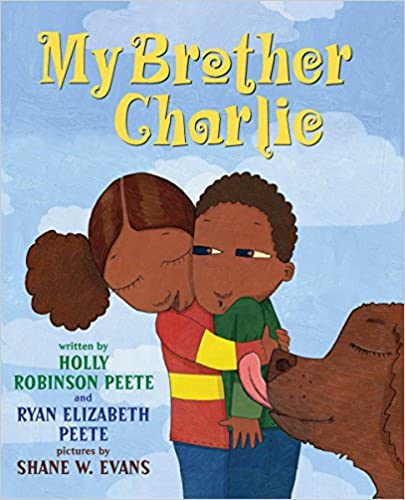

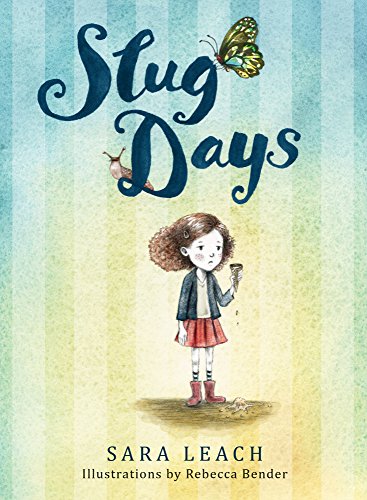
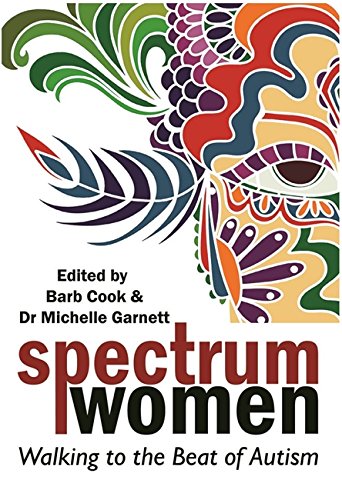
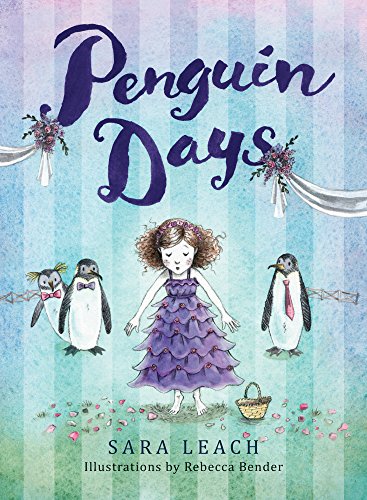

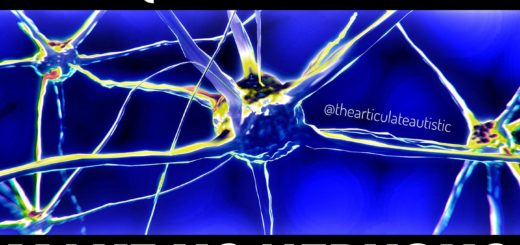

what do you with a husband who thinks your autistic son can turn it off and on
Oh, goodness! It sounds like your husband needs to better educate himself on neurodiversity. If I can help, I’d be glad to. Let me know. I do private consultations.
Either adhd (not diagnosed) and autism have this in common, or I need to reconsider my thoughts that I’m not autistic. I’ve spent years and years trying to tell people that unless they explain, I don’t know which part of what I did was wrong. And I will do it again until it is explained…or worse, over correct and end up thinking ANY opinion, emotion, or stance of mine is wrong.
I’m not sure if ADHD has this in common with being autistic, but I do understand how you feel. I need every single detail explained, or I just don’t “get it”.
I (an autistic person) sometimes have periods where I have more difficulty speaking than others, and my speech can become incredibly stilted and restricted.
Whenever this happens, people around me get annoyed, then impatient, and then angry, because they think I’m doing it deliberately and that I must be treating them badly by not responding immediately.
I’ve tried to explain to them many times that I have little/no control over it, but they always default to assuming I know that I doing it and that I’m choosing to be rude to them.
What should I do?
That’s a good question. I think one of the most difficult things about autistic-to-neurotypical communication is the unwillingness of some neurotypical people to see past their own communication style and intentions. I would recommend sharing this article with them. I also do offer private consultations, if they would like to speak to me, or you would like someone to corroborate for you. Here is the link for that, if you’re interested: https://www.thearticulateautistic.com/translate-autistic-behavior/
I was actually kicked off a Discord server once, as in I had a conversation on it before I went to bed and when I checked Discord in the morning, that server was no longer on my list. Now, I had been very annoyed and rather snappy during that conversation, but it still confuses me that it had been bad enough to be kicked off. But that’s not even what made it so confusing. The entire reason I was on that server? I was looking for a safe space where I didn’t have to pretend to be normal. That server was actually made for autistic people. Hence, why it makes perfect sense to get an explanation at the very least!
What if you communicate to your ASD loved one that they hurt you and they continue to make the same remarks, and even dismiss your feelings by saying, “well, I would want to know”?
It’s very important to understand that your autistic loved one has no intention of dismissing your feelings when they say, “Well, I would want to know.” That’s a literal statement. They would want to know whatever it is that they are telling you. For them to understand your meaning and needs, you have to explicitly and literally tell them, “I don’t want to know. If I do this or that or say this or that, and it bothers you. I don’t want to know.” Unfortunately, you then run the risk of unintentionally upsetting THEM by not being willing to make changes to the way you respond to them, which, it sounds like they are saying they would because they would want to know. They want to know because they don’t want to continually upset you or have you upset with them. Autistic people are considered rude because of how direct we are, but if you take our words at face value to mean exactly what we say, it may help you avoid inserting your own perceptions about their intentions and responding in a way that doesn’t make sense to them. Neither one of you is trying to hurt the other, it’s just a communication mismatch.
Hi, I really like the way you explain things through relatable stories. I would like to suggest you change the word “neurotypical” here to “allistic” though, both bc you explained it as not-autistic and also bc this assumed bad intention is very common in adhders bc of RSD. RSD is actually a worse version of this offended mindreading that NTs display. The circumstances of particularly intense expressions of anger you talk about, such as throwing a coffee mug across a room, are more likely to have been ADHDers bc of issues with impulse control and emotional dysregulation. The situations where somekne just gave you a bad look or politely avoided you are more likely to be NTs, unless it was a group situation where they get all tribal.
Also maybe could you note that *some* autistic people may forget what they said. That panic shutdown reaction – terror is what it is I guess – doesn’t happen with everyone. And it’s also only momentary, like its mental freeze due to being accused of something in the moment not permanent memory loss. I used to have it, but now I remember conversations almost word for word. Autistics have better rote memories than nts when we’re not stressed. I find conflict with NTs arises bc they say sentences meaninglessly and when I don’t shift topic bc I still want to finish the previous one they feel a sense of confrontation but have forgotten the words they actually said, which would logically lead to my further questioning.
I would definitely share a lot of the stories you write though. It’s such an important thing you’re doing, thank you for doing it.
Don’t you get sick of trying to get them to understand you?I gave up years ago. I am sick of explaining myself.
They will always other us. They can’t help themselves.
I’m glad I have parents who got me diagnosed early in life and were understanding! “You know what you did” is the way of tyrants like Stalin. It has no place in a free society. Even people who have committed the worst crimes imaginable cannot be arrested and punished without being told what they did. If we are willing to grant rapists and murderers that courtesy, why deny it to people who haven’t even broken the law?
I have always known my daughter was “sensitive” and I finally figured out when she was about 23 that it was autism. Because she is so smart and can make eye contact, and because she is female, nobody ever diagnosed her. They just said she was anxious and wanted to medicate her. She is 29 and lives with me and I adore her. These posts she sent me have REALLY helped me understand her and want to change how I communicate with her. Thank you so very much.
I’m so glad my articles have helped you. That’s wonderful. 🙂 I also have a book out called, “What Did I Do Wrong?” that might give you some deeper insight into how your daughter thinks and processes the world. It might even help her better understand herself. I’ll put the link below for you. You’re a good mama, Candi. Thanks for stopping by and leaving a comment 🙂
https://www.barnesandnoble.com/w/what-did-i-do-wrong-jaime-heidel/1147206518